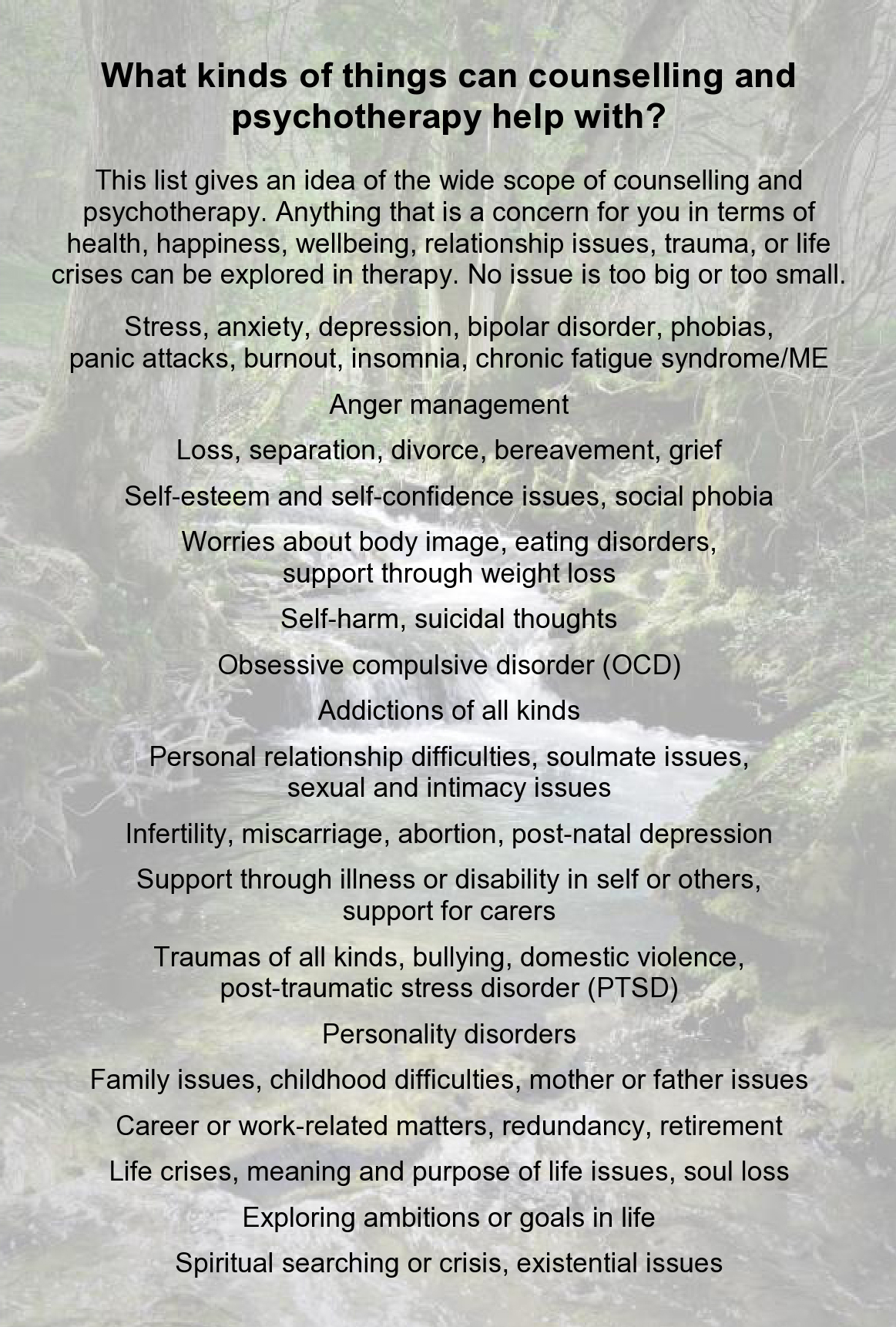
Counselling and Psychotherapy
It is increasingly recognised these days that mental health is just as deserving of care and attention as physical health. Indeed, the two are totally interconnected. Stress, anxiety and depression can be very debilitating, sometimes seriously so. If left untreated, they may alter the course of people’s lives. In essence, they are simply natural adaptations to challenging situations. Life circumstances, however, and lowered personal resilience and other predisposing factors may mean we are drawn into a loop of chronic emotional and behavioural patterns. This in turn may prevent us being able to manage our day-to-day life. When this makes us unhappy, or our coping strategies become part of the problem, people may feel it’s time to seek help. Family members, friends and colleagues might also be affected by or implicated in an individual’s health status. So relationships are a prime area of concern in therapy.
It’s not necessary to have been diagnosed with anything before seeking therapy. Equally, if you do have a diagnosis, first and foremost you are a valued and valuable human being, and that’s where we start from in therapy. Everything that happens in counselling and psychotherapy is based on three core conditions – empathy, the congruence or genuineness of the therapist, and unconditional positive regard for the client.
So counselling and psychotherapy are for anyone wanting to talk through what’s troubling them with a trained professional. Therapists are caring and compassionate, and take an objective and non-judgmental view of things. Moreover, therapy is different from trying to talk with friends or relatives. It offers the chance to understand what’s happening with the potential for change. And, of course, everything is held in strict confidence.

Counselling and Psychotherapy
It is increasingly recognised these days that mental health is just as deserving of care and attention as physical health. Indeed, the two are totally interconnected. Stress, anxiety and depression can be very debilitating, sometimes seriously so. If left untreated, they may alter the course of people’s lives. In essence, they are simply natural adaptations to challenging situations. Life circumstances, however, and lowered personal resilience and other predisposing factors may mean we are drawn into a loop of chronic emotional and behavioural patterns. This in turn may prevent us being able to manage our day-to-day life. When this makes us unhappy, or our coping strategies become part of the problem, people may feel it’s time to seek help. Family members, friends and colleagues might also be affected by or implicated in an individual’s health status. So relationships are a prime area of concern in therapy.
It’s not necessary to have been diagnosed with anything before seeking therapy. Equally, if you do have a diagnosis, first and foremost you are a valued and valuable human being, and that’s where we start from in therapy. Everything that happens in counselling and psychotherapy is based on three core conditions – empathy, the congruence or genuineness of the therapist, and unconditional positive regard for the client.
So counselling and psychotherapy are for anyone wanting to talk through what’s troubling them with a trained professional. Therapists are caring and compassionate, and take an objective and non-judgmental view of things. Moreover, therapy is different from trying to talk with friends or relatives. It offers the chance to understand what’s happening with the potential for change. And, of course, everything is held in strict confidence.


A unique and powerful therapy
The EMDR Association’s website has a selection of resources and further information about EMDR therapy here. The EMDR International Association’s EMDRIA Video explains how it works and what it’s like to do EMDR.
Make an Enquiry
If you would like more information about psychological therapy and how we may be able to work together to address your concerns,
you are warmly invited to call, email, or message me through the form on the Contact page.
07801 273768 / info@karenjwilliams.co.uk


